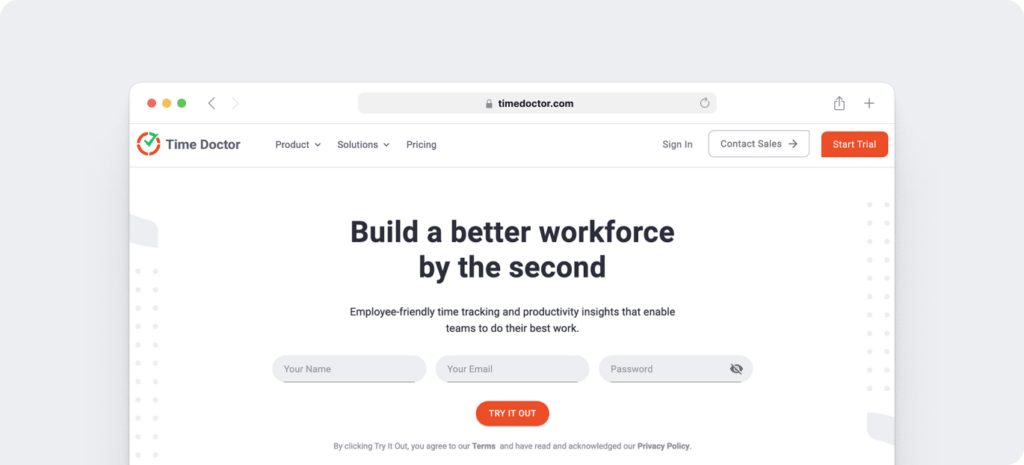Looking for tips to improve your time management while working from home?
Working from home allows you to enjoy homemade coffee, flexible schedules, and spend some quality time with your family.
However, when you have several projects to tackle and deadlines to meet, you need proper time management skills to ensure you have an excellent work-life balance.
In this article, we’ll provide 15 tips to help sharpen your time management skills while work from home. We’ll also go through the advantages and disadvantages of working from home.
This article includes:
(Click on specific links to jump to a particular section)
- How To Manage Time While Working From Home?
- What Are The Benefits Of Working From Home?
- What Are The Disadvantages Of Working From Home?
Let’s begin.
How to manage time while working from home?
Work from home is an arrangement where employees manage their work from the comforts of home instead of a brick-and-mortar office.
A U.S Census Bureau and U.S Bureau of Labor Statistics analysis showed that nearly 3.4% of the US population (4.7 million people) were already working from home before the COVID 19 pandemic.
And with the pandemic, several employees have shifted to working from home.
However, working from home brings in several challenges — the main one being managing time effectively between work and personal life.
So here are 15 time management tips that will help you ace working from home:
1. Make a schedule
Preparing a schedule is an essential time management tip for attaining peak productivity.
You can divide the schedule into two parts:
A. Monthly schedule
Block all tasks, including Zoom meetings, deadlines, family gatherings, and even doctor’s appointments for an entire month.
No matter how small these special tasks might be, note them all down in a ledger or a notepad app so you don’t forget them.
Why?
Blocking these special tasks will help you plan your daily schedules better. This way, you can prevent booking too many appointments for one day.
B. Daily to-do list
In addition to the monthly schedule, you will need a to-do list with your daily tasks.
Consider creating a detailed time table for every workday. The list should include all tasks, long and short alike.
Once you prepare the to-do list, estimate the time you’ll require to complete each task and sort them accordingly.
This way, you can begin your work day without worrying about other tasks.
But how do you stay motivated to complete all the tasks?
You can mark the task complete the moment you complete them. As you finish each task, you’ll be encouraged to start the next.
2. Avoid overworking
It’s easy to slack off when at home. However, it’s easier to overwork yourself.
How?
Keeping track of time when you’re working from an office is simple.
There’s a fixed time to punch in and out, and you’ll know it’s closing time when you see your team members leaving.
However, when you’re working from home, you don’t have these indicators.
Almost every important task can keep you busy, and you might not have enough time left for your personal life.
To prevent overworking:
- Set the alarm for the end of the day.
- Keep your work devices away after work hours.
- Ask others to notify you when it’s time to stop.
3. Take regular breaks
Do you feel taking breaks in between work will disrupt the flow?
According to a survey conducted by Airtasker, taking regular breaks while working from home has been shown to increase productivity by 37 percent.
Additionally, taking regular breaks is rejuvenating and can help you accomplish more during a workday.
4. Set up a work space
Grab a comfortable chair, a desk, your files, and a laptop. Arrange them in a spot that has high wi-fi coverage, and your workspace is all set.
Once working from your home office becomes a routine, you can easily switch from your relaxed mood to work mode whenever you enter it.
How?
Your mind creates a physical connection with the spot and automatically helps you focus on work.
Similarly, designate activities to each corner of the house. This will help you manage your household chores too.
For example, you can routinely attend your Linkedin Learning courses from your living room, tutor your children in their study room, etc.
5. Dress for work
If you wake up at 7 AM to go to the office, do the same when you work from home.
And just like how a daily routine can help you focus, so can your attire and attitude.
Try getting ready for your work like you would when you go to the office – this includes taking a shower and dressing up.
Your mind would spontaneously go into work mode; and, you’ll feel fresh and more energized too.
6. Reduce distractions
Distractions are everywhere – whether it’s the noise from a TV, loud music from your neighbor’s or non-work related messages from a coworker.
Distractions make it hard to concentrate and, consequently, affect productivity.
To get your work done, you can:
- Take breaks regularly to avoid distractions caused by burnout.
- Play music or white noise that helps you concentrate.
- Put your phone in “do not disturb” mode.
- Inform your family members or roommates about your work schedule so that they don’t disturb you.

7. Talk to your manager
One of the highlights of working from home is flexible working hours. You can start whenever you want as long as you get your work done on time.
But how will your remote team know when you’re available?
Inform your manager about your working hours and when you’ll complete your tasks. This will help your manager and the rest of your remote team and plan their schedule accordingly.
Additionally, you can ask your boss to allow you to work from home even after the Coronavirus pandemic.
Want to know how to convince your manager to work remotely?
8. Determine when you’re the most productive
Not everyone is productive throughout a workday.
Some are efficient for a single work hour, while others are at their peak for four hours or more.
You would be able to accomplish more during your productive hours than you would during the rest of the day.
How can you use this to your advantage?
Note down the times when you could focus on the task without getting distracted. It could be after you wake up from a nap, after breakfast, etc.
Once you know when you’re productive, plan your work time table such that you do difficult tasks during those hours.
9. Stop multitasking
Even though multitasking gets work done, it doesn’t guarantee perfection.
Why?
When you multitask, your concentration is divided between several tasks, and you might miss something out. So the more tasks you manage at a time, the lower your efficiency would be.
Here are a few tips to help you prevent multitasking:
- Prioritize tasks when you feel like multitasking.
- Be mindful of your thoughts and fight any urges to multitask.
- Take up activities that can help you strengthen your focus, such as exercising or meditating.
10. Block non-work websites, social media, and games
What a person does during their break will depend on what they like.
However, taking breaks comes with a few guidelines.
Try to avoid browsing websites unrelated to work, playing video games, or using social media apps like Instagram.
These activities can be so engaging that you might forget to resume work even after the break. So it’s better to spend breaks doing other activities such as cooking or talking to your friends and family.
11. Assign goals and rewards
Set yourself a goal. Once you reach it, reward yourself.
It’s a simple trick, but it always works with remote workers!
So if you love watching a specific TV show, allow yourself to watch an episode every day after completing all the tasks.
Giving yourself goals to achieve will motivate you to work hard.
Sometimes, it’s the reward that’s attractive. Other times, it can be the challenge that drives you to boost your productivity.
12. Ensure your well being
We have been talking about reaching maximum productivity without addressing a vital part of it – your wellness.
Think about it.
When people are unhappy with their full-time job, imagine how mentally exhausting working in isolation can be.
That’s why, as a remote worker, you need to take care of your mental and physical health.
Here’s how you can focus on your wellbeing:
- Engage in conversations with your coworkers.
- Do at least 30 minutes of cardio every day.
- Pick up a hobby which you can enjoy on weekends.
- Sleep for at least eight hours.
Most importantly, keep time aside for yourself.
13. Include family time in your daily schedule
Always block an hour or two to spend with your family. It can be during breakfast, during lazy afternoons, or around bedtime.
Moreover, your family plays a huge role while you work from home. So talking to them openly about your worries, problems, and expectations will make your work easier.
Working parents can ask their children to help with simple chores like washing dishes and cleaning. Additionally, you and your partner can synchronize your break times so you can spend more time together.
14. Be mindful of procrastination
People often underestimate the time it takes to complete a task and end up procrastinating.
For example, let’s say your project is due on Friday.
On Monday, you estimate that it would take 8 hours to complete your work. So you spend all week procrastinating and when Thursday rolls around, you realize that the project would take two days to complete.
So to prevent this stressful situation, plan your schedule keeping this in mind.
Always allow more time than you feel needed for each task — so in case you do procrastinate, you won’t have to chase deadlines.
15. Use a productivity tool
What if you could know how productive you were throughout the day?
It could help you understand your most productive hours, what activities distract you, and more.
Fortunately, with Time Doctor, tracking productivity is a piece of cake.

Time Doctor is a productivity management app designed to help you manage your time.
From established firms and small businesses, companies use Time Doctor to boost the productivity of their remote workforce.
With Time Doctor, you can:
- Write down tasks you need to complete.
- Record the time it takes to finish each task and project.
- Monitor your browsing time during a break.
- Get a detailed report of how you spent your workday.
- Track time when you’re on the go with the Android app.
What are the benefits of working from home?
When done correctly, working from home has its advantages.
Let’s take a look at some of them:
1. Save money by telecommuting
How much money do you spend on commuting to work?
On average, ticket costs add up to around a few thousand dollars per year (varies depending on transport mode). And the value of time spent commuting would account for about $5200 per year.
Why spend so much on commuting when you can work from home?
2. Flexible work schedule
Another benefit of remote working is that you have flexible working hours.
You can start at 11 AM and still take an hour-long lunch break at noon.
You can begin and end your day and take lunch breaks whenever you want- as long as the tasks are complete and your remote team members are informed.
Letting your team members know when you’ll be available is crucial since everyone would be working from various time zones.
3. No dress code
Working from home lets you work in your comfiest clothes. Additionally, dressing according to your mood can motivate you to work.
A study presented that 61% of employees are more productive in relaxed outfits. The study also pointed out that comfortable and confident clothing can improve employee’s morale and efficiency.
What are the disadvantages of working from home?
However, just like how work from home has a set of merits, it also has demerits.
Some of the disadvantages of working at home include:
1. Poor communication
Communication within a team might be more comfortable now with applications like Slack, Telegram, and Zoom.
That doesn’t mean it can replace a real team meeting. A real conversation is always better than a virtual team meeting when discussing tasks in detail.
How?
Virtual calls rely on the internet and gadgets like mobile phones that could fail anytime and interrupt the conversation.
Additionally, you could misinterpret what’s said during a virtual meeting as you might not be able to read body language well.
2. Lack of equipment
Your office will mostly have everything needed for work.
You’ll have printers and fax machines at the office which are essential for your work.
And as they aren’t necessary for a household, there isn’t a point in getting such tools.
Since you’re a remote employee, you might not have office equipment at home, and its unavailability might make your work at home difficult.
Final thoughts
Effective time management is the key to making working from home stress-free.
It helps you develop and execute a work plan and allows you to maintain a work life balance.
If you’re working from home now, you could learn a few time management skills to organize tasks.
So start today by making a schedule and change your work from home life!

Liam Martin is a co-founder of Time Doctor which is software to improve productivity and help keep track and know what your team is working on, even when working from home.


